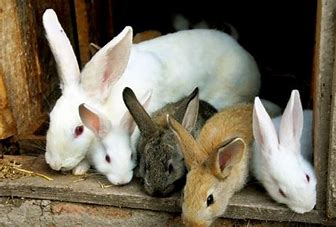

Grace Aleng tasted rabbit meat stew as part of meals often prepared by her grandmother.
From the tasty broth, she made up her mind that when she had some money, she would invest in rearing rabbits.
Starting
In February 2014, she had saved Shs380,000 from her upkeep in high school. She bought five female rabbits and two male ones. She started her venture at her mother’s site in Kireka, first under the name Graceland and later as Vert Fields Limited, which she had grown to benefit rabbit farmers in Nebbi District, in northern Uganda.
On August 21 in 2014 Aleng, with her team, were able to exhibit its first products of fillet, thigh, whole rabbit and samples of manure from rabbit droppings at an exhibition organised by International Labour Organisation (ILO) at Uganda Manufacturers Association (UMA) showground, located in Lugogo, Kampala.
Value addition classes
Following the event, Aleng applied for training in value addition at the Uganda Industrial Research Institute (UIRI). In September that year, she was admitted to the institute.
“It is at this place that we produced our very first rabbit sausages and burgers. The products were welcomed with great results on the market. With the training attained in value addition, I was able to come up with a brand name for my product, ‘Tokkibits’. Rabbit farming with value addition would be a great source of employment and agricultural enhancement through production of manure,” Aleng explains.
At the industrial research institute, she learnt how to use the simple yet amazing technology. It stimulated her desire to breed and look after more rabbits so as to sustainably have raw materials for the production of rabbit products.
The developed strategy then was to go down to the grass root in northern Uganda, mobilize post war vulnerable youth, women and adolescent mothers affected by poverty.
The aim was to teach them the basics of rearing rabbits as breeders who would in turn sell their rabbits to the organisation for value addition. With that in mind, she was convinced she would make a humble contribution to Uganda’s social economic transformation.
That was in tandem with UIRI whose mission is to catalyse socio-economic transformation of Uganda through enhanced technology use.
“Rabbits are the simplest to care for and fastest growing animals with the highest breeding rates that I know of. Its gestation period is only 28 to 32 days which really gives it a higher multiplication rate, hence making faster returns for the women and farmers we work with,” the youthful farmer explains.
Benefits
For anyone looking at venturing into rabbit farming, cleanness is key, both in their living environments and food. Aleng learnt the basics of rearing rabbits from her grandmother.
“The rabbit meat itself is a green pasture for great health and that is the main reason I decided to venture into it. I tasted how delicious it was and decided to research about its meat benefits and I was awed to find out that rabbit meat is white meat, low fat, lowest in cholesterol, increases the general body metabolism of a human body and above all helps diabetic patients regulate through constant consumption,” she says.
She learnt this first hand, having lived with a diabetic mum and seen how much she had suffered painfully. Aleng testifies that the meat helped her mother as well as her aunt who had been diagnosed with a cholesterol problem.
Market
“My clients are high-end people who love and care about their health. We do supplies every weekend for orders earlier placed in the week, and at parties, festivals, exhibitions. Our products can be found at Mega Standards supermarket down town, Hotel Africana, The Elements Kira, Kireka, and Uganda Industrial Research Institute (UIRI),” she adds.
The target of Tokkibits is to expand into neighbouring markets of Democratic Republic of Congo (DRC) and to also have a meat processing plant in Nebbi which is closer to the prospective markets and rabbit farmers. In Nebbi, some of the rabbit farmers, united under Vert Fields Limited, an organisation through which she economically empowers disadvantaged rural women and youth to rear rabbits, and add value to their meat.
Advice
“My lessons in this business is that trust is important in the business. Patience is key because being a new product, money does not come in its early stages but we are hopeful,” Aleng further explains. For her efforts as a rabbit farmer, Aleng was awarded a certificate of appreciation by the Rotary Club of Mukono in 2014 for the educative talk presented to it on the topic, ‘Benefits of Rabbit Farming and Value Additions’.
Next Reading
Foot and Mouth Disease
Foot-and-mouth disease (FMD) is a severe, highly contagious viral disease of cattle and swine. It […]
Previous Reading
Understanding a common disease in poultry
Understanding a common disease in poultry reared under intensive housing system that farmers ignore Foot […]
 Contact Jaguza Support
Contact Jaguza Support